MNC's Sustainability Management: A Case Study of Mars
VerifiedAdded on 2022/11/14
|11
|3043
|57
AI Summary
This case study explores Mars' sustainability measures in areas such as human rights, environmental protection, global supply chain issues, and poverty and resource scarcity. It also discusses the role of virtue ethics, UN declarations, and globalization drivers in shaping Mars' CSR strategies.
Contribute Materials
Your contribution can guide someone’s learning journey. Share your
documents today.
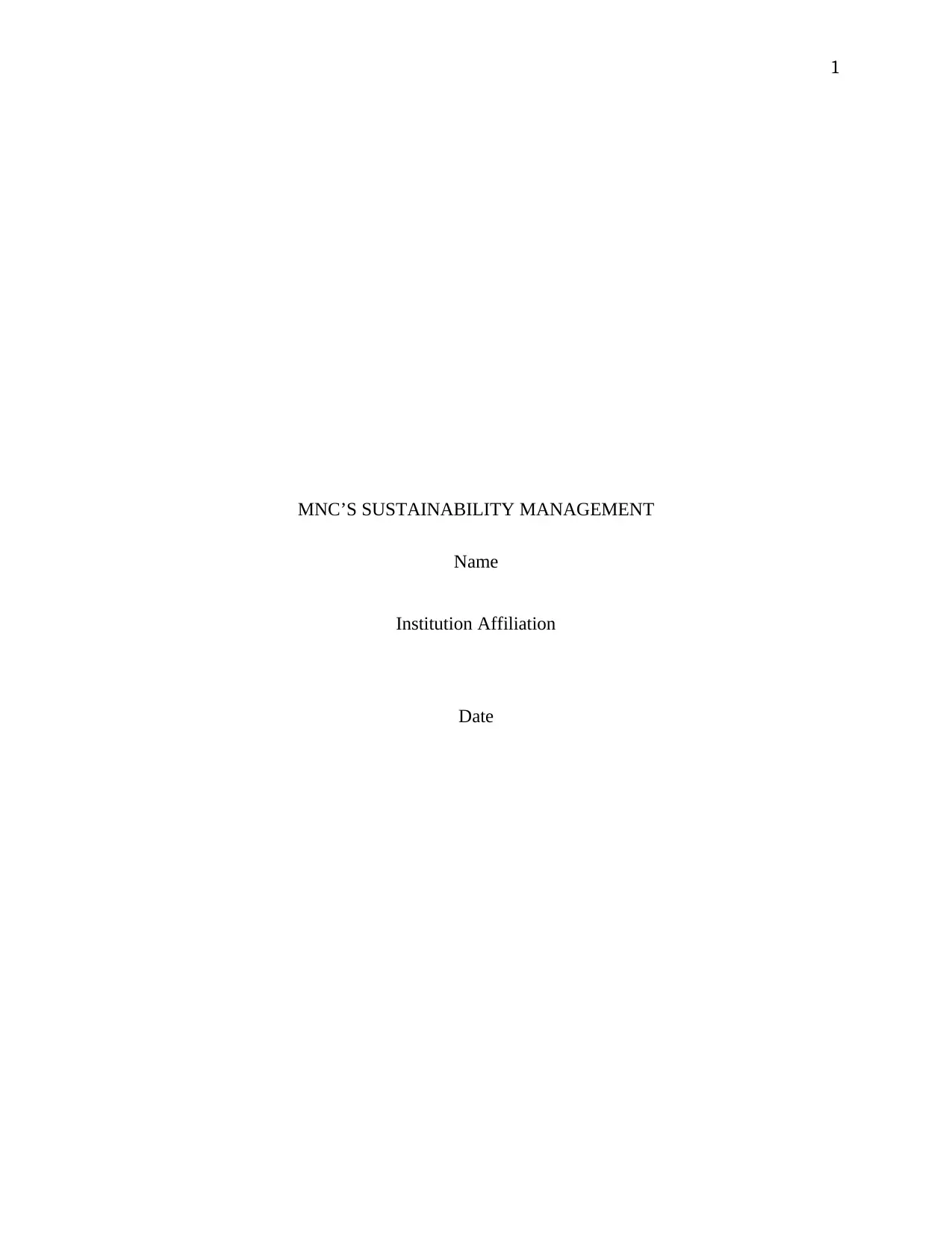
1
MNC’S SUSTAINABILITY MANAGEMENT
Name
Institution Affiliation
Date
MNC’S SUSTAINABILITY MANAGEMENT
Name
Institution Affiliation
Date
Secure Best Marks with AI Grader
Need help grading? Try our AI Grader for instant feedback on your assignments.
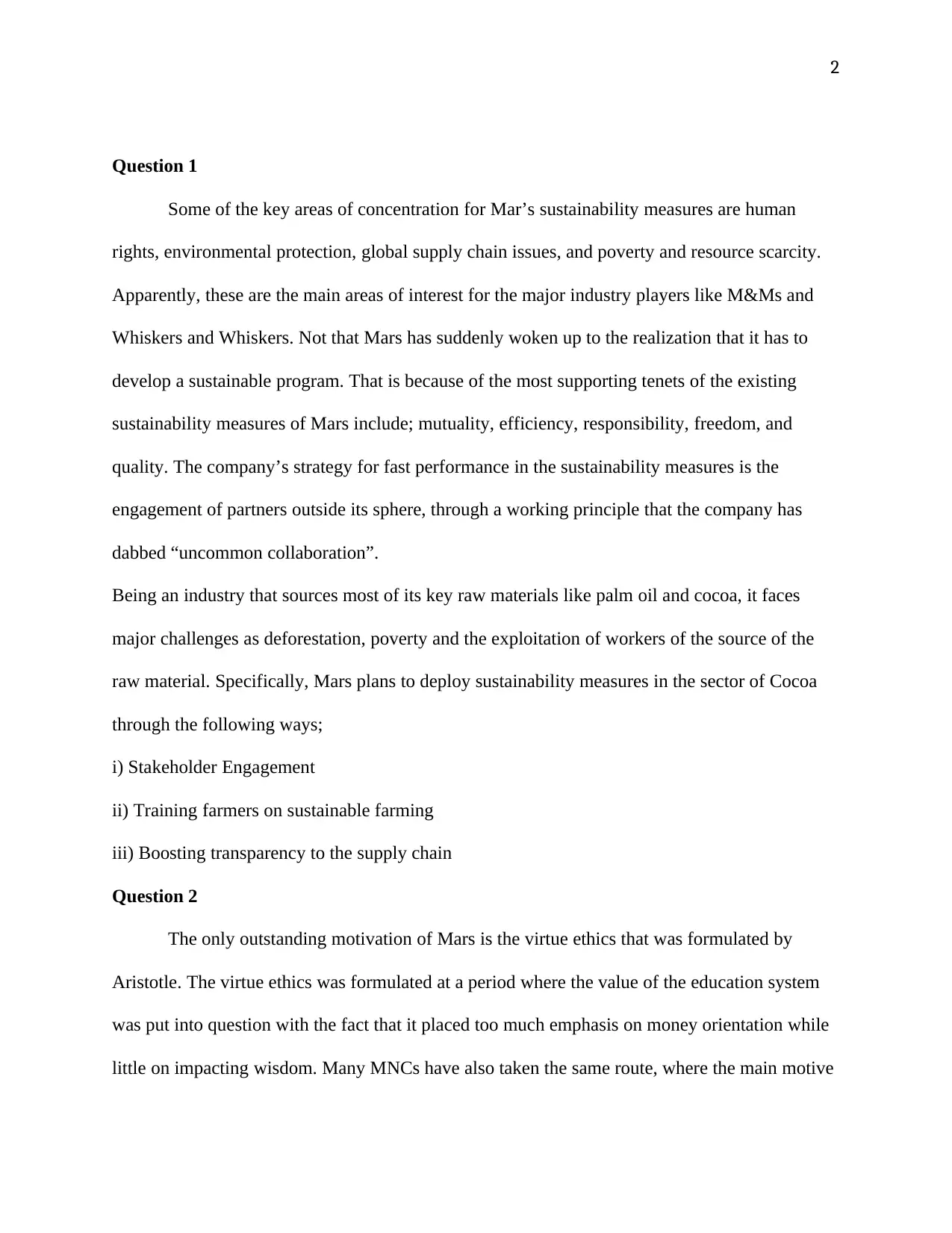
2
Question 1
Some of the key areas of concentration for Mar’s sustainability measures are human
rights, environmental protection, global supply chain issues, and poverty and resource scarcity.
Apparently, these are the main areas of interest for the major industry players like M&Ms and
Whiskers and Whiskers. Not that Mars has suddenly woken up to the realization that it has to
develop a sustainable program. That is because of the most supporting tenets of the existing
sustainability measures of Mars include; mutuality, efficiency, responsibility, freedom, and
quality. The company’s strategy for fast performance in the sustainability measures is the
engagement of partners outside its sphere, through a working principle that the company has
dabbed “uncommon collaboration”.
Being an industry that sources most of its key raw materials like palm oil and cocoa, it faces
major challenges as deforestation, poverty and the exploitation of workers of the source of the
raw material. Specifically, Mars plans to deploy sustainability measures in the sector of Cocoa
through the following ways;
i) Stakeholder Engagement
ii) Training farmers on sustainable farming
iii) Boosting transparency to the supply chain
Question 2
The only outstanding motivation of Mars is the virtue ethics that was formulated by
Aristotle. The virtue ethics was formulated at a period where the value of the education system
was put into question with the fact that it placed too much emphasis on money orientation while
little on impacting wisdom. Many MNCs have also taken the same route, where the main motive
Question 1
Some of the key areas of concentration for Mar’s sustainability measures are human
rights, environmental protection, global supply chain issues, and poverty and resource scarcity.
Apparently, these are the main areas of interest for the major industry players like M&Ms and
Whiskers and Whiskers. Not that Mars has suddenly woken up to the realization that it has to
develop a sustainable program. That is because of the most supporting tenets of the existing
sustainability measures of Mars include; mutuality, efficiency, responsibility, freedom, and
quality. The company’s strategy for fast performance in the sustainability measures is the
engagement of partners outside its sphere, through a working principle that the company has
dabbed “uncommon collaboration”.
Being an industry that sources most of its key raw materials like palm oil and cocoa, it faces
major challenges as deforestation, poverty and the exploitation of workers of the source of the
raw material. Specifically, Mars plans to deploy sustainability measures in the sector of Cocoa
through the following ways;
i) Stakeholder Engagement
ii) Training farmers on sustainable farming
iii) Boosting transparency to the supply chain
Question 2
The only outstanding motivation of Mars is the virtue ethics that was formulated by
Aristotle. The virtue ethics was formulated at a period where the value of the education system
was put into question with the fact that it placed too much emphasis on money orientation while
little on impacting wisdom. Many MNCs have also taken the same route, where the main motive
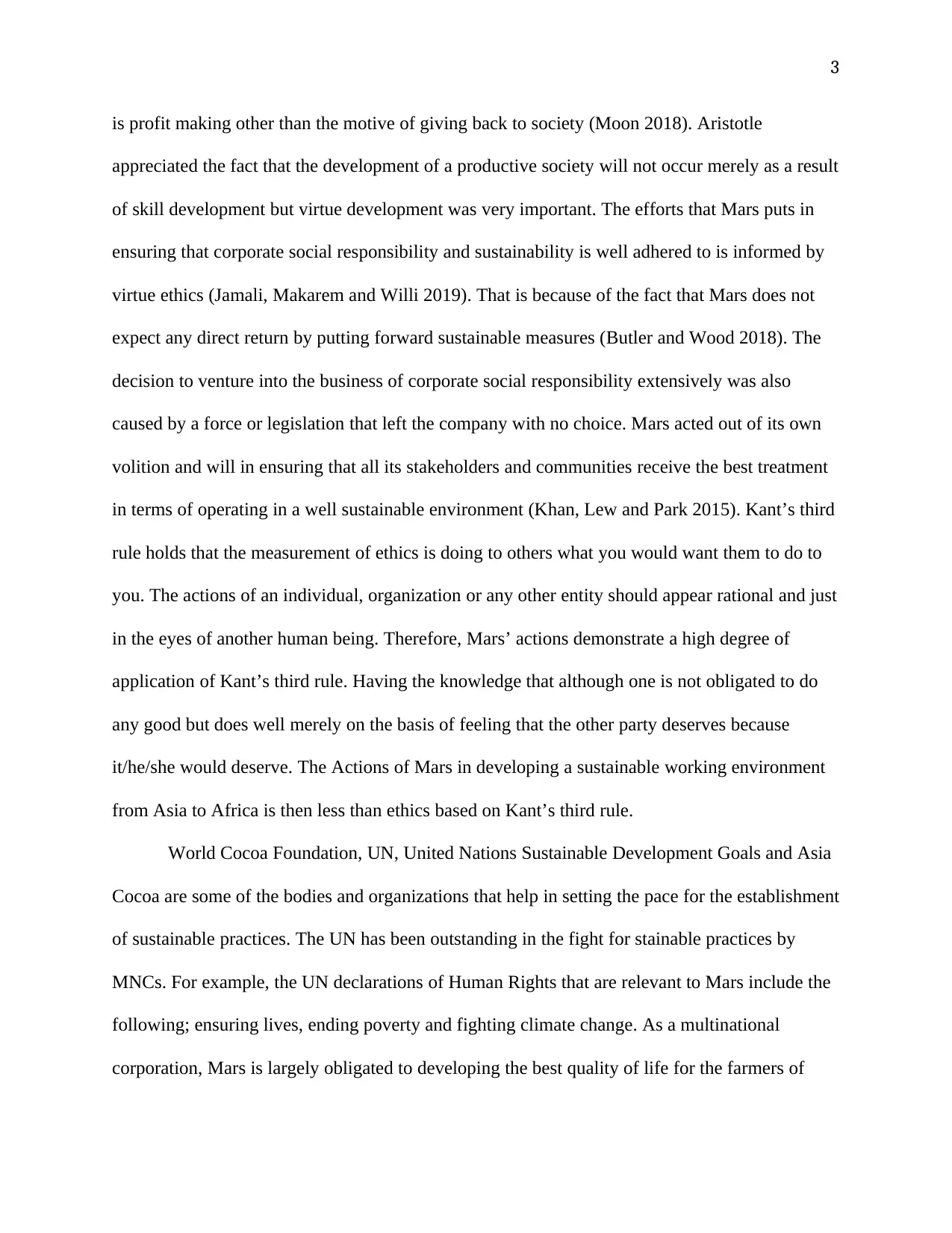
3
is profit making other than the motive of giving back to society (Moon 2018). Aristotle
appreciated the fact that the development of a productive society will not occur merely as a result
of skill development but virtue development was very important. The efforts that Mars puts in
ensuring that corporate social responsibility and sustainability is well adhered to is informed by
virtue ethics (Jamali, Makarem and Willi 2019). That is because of the fact that Mars does not
expect any direct return by putting forward sustainable measures (Butler and Wood 2018). The
decision to venture into the business of corporate social responsibility extensively was also
caused by a force or legislation that left the company with no choice. Mars acted out of its own
volition and will in ensuring that all its stakeholders and communities receive the best treatment
in terms of operating in a well sustainable environment (Khan, Lew and Park 2015). Kant’s third
rule holds that the measurement of ethics is doing to others what you would want them to do to
you. The actions of an individual, organization or any other entity should appear rational and just
in the eyes of another human being. Therefore, Mars’ actions demonstrate a high degree of
application of Kant’s third rule. Having the knowledge that although one is not obligated to do
any good but does well merely on the basis of feeling that the other party deserves because
it/he/she would deserve. The Actions of Mars in developing a sustainable working environment
from Asia to Africa is then less than ethics based on Kant’s third rule.
World Cocoa Foundation, UN, United Nations Sustainable Development Goals and Asia
Cocoa are some of the bodies and organizations that help in setting the pace for the establishment
of sustainable practices. The UN has been outstanding in the fight for stainable practices by
MNCs. For example, the UN declarations of Human Rights that are relevant to Mars include the
following; ensuring lives, ending poverty and fighting climate change. As a multinational
corporation, Mars is largely obligated to developing the best quality of life for the farmers of
is profit making other than the motive of giving back to society (Moon 2018). Aristotle
appreciated the fact that the development of a productive society will not occur merely as a result
of skill development but virtue development was very important. The efforts that Mars puts in
ensuring that corporate social responsibility and sustainability is well adhered to is informed by
virtue ethics (Jamali, Makarem and Willi 2019). That is because of the fact that Mars does not
expect any direct return by putting forward sustainable measures (Butler and Wood 2018). The
decision to venture into the business of corporate social responsibility extensively was also
caused by a force or legislation that left the company with no choice. Mars acted out of its own
volition and will in ensuring that all its stakeholders and communities receive the best treatment
in terms of operating in a well sustainable environment (Khan, Lew and Park 2015). Kant’s third
rule holds that the measurement of ethics is doing to others what you would want them to do to
you. The actions of an individual, organization or any other entity should appear rational and just
in the eyes of another human being. Therefore, Mars’ actions demonstrate a high degree of
application of Kant’s third rule. Having the knowledge that although one is not obligated to do
any good but does well merely on the basis of feeling that the other party deserves because
it/he/she would deserve. The Actions of Mars in developing a sustainable working environment
from Asia to Africa is then less than ethics based on Kant’s third rule.
World Cocoa Foundation, UN, United Nations Sustainable Development Goals and Asia
Cocoa are some of the bodies and organizations that help in setting the pace for the establishment
of sustainable practices. The UN has been outstanding in the fight for stainable practices by
MNCs. For example, the UN declarations of Human Rights that are relevant to Mars include the
following; ensuring lives, ending poverty and fighting climate change. As a multinational
corporation, Mars is largely obligated to developing the best quality of life for the farmers of
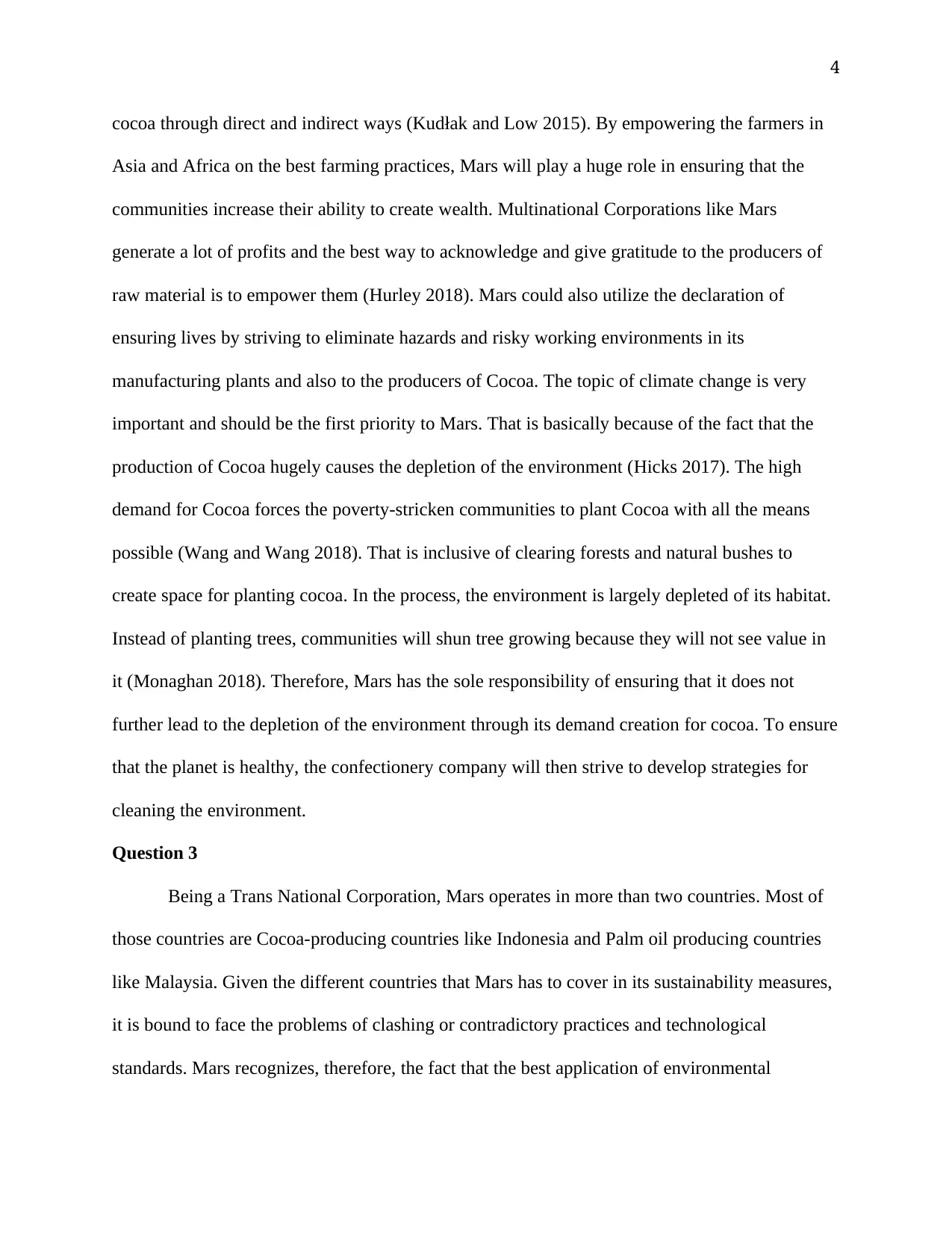
4
cocoa through direct and indirect ways (Kudłak and Low 2015). By empowering the farmers in
Asia and Africa on the best farming practices, Mars will play a huge role in ensuring that the
communities increase their ability to create wealth. Multinational Corporations like Mars
generate a lot of profits and the best way to acknowledge and give gratitude to the producers of
raw material is to empower them (Hurley 2018). Mars could also utilize the declaration of
ensuring lives by striving to eliminate hazards and risky working environments in its
manufacturing plants and also to the producers of Cocoa. The topic of climate change is very
important and should be the first priority to Mars. That is basically because of the fact that the
production of Cocoa hugely causes the depletion of the environment (Hicks 2017). The high
demand for Cocoa forces the poverty-stricken communities to plant Cocoa with all the means
possible (Wang and Wang 2018). That is inclusive of clearing forests and natural bushes to
create space for planting cocoa. In the process, the environment is largely depleted of its habitat.
Instead of planting trees, communities will shun tree growing because they will not see value in
it (Monaghan 2018). Therefore, Mars has the sole responsibility of ensuring that it does not
further lead to the depletion of the environment through its demand creation for cocoa. To ensure
that the planet is healthy, the confectionery company will then strive to develop strategies for
cleaning the environment.
Question 3
Being a Trans National Corporation, Mars operates in more than two countries. Most of
those countries are Cocoa-producing countries like Indonesia and Palm oil producing countries
like Malaysia. Given the different countries that Mars has to cover in its sustainability measures,
it is bound to face the problems of clashing or contradictory practices and technological
standards. Mars recognizes, therefore, the fact that the best application of environmental
cocoa through direct and indirect ways (Kudłak and Low 2015). By empowering the farmers in
Asia and Africa on the best farming practices, Mars will play a huge role in ensuring that the
communities increase their ability to create wealth. Multinational Corporations like Mars
generate a lot of profits and the best way to acknowledge and give gratitude to the producers of
raw material is to empower them (Hurley 2018). Mars could also utilize the declaration of
ensuring lives by striving to eliminate hazards and risky working environments in its
manufacturing plants and also to the producers of Cocoa. The topic of climate change is very
important and should be the first priority to Mars. That is basically because of the fact that the
production of Cocoa hugely causes the depletion of the environment (Hicks 2017). The high
demand for Cocoa forces the poverty-stricken communities to plant Cocoa with all the means
possible (Wang and Wang 2018). That is inclusive of clearing forests and natural bushes to
create space for planting cocoa. In the process, the environment is largely depleted of its habitat.
Instead of planting trees, communities will shun tree growing because they will not see value in
it (Monaghan 2018). Therefore, Mars has the sole responsibility of ensuring that it does not
further lead to the depletion of the environment through its demand creation for cocoa. To ensure
that the planet is healthy, the confectionery company will then strive to develop strategies for
cleaning the environment.
Question 3
Being a Trans National Corporation, Mars operates in more than two countries. Most of
those countries are Cocoa-producing countries like Indonesia and Palm oil producing countries
like Malaysia. Given the different countries that Mars has to cover in its sustainability measures,
it is bound to face the problems of clashing or contradictory practices and technological
standards. Mars recognizes, therefore, the fact that the best application of environmental
Secure Best Marks with AI Grader
Need help grading? Try our AI Grader for instant feedback on your assignments.
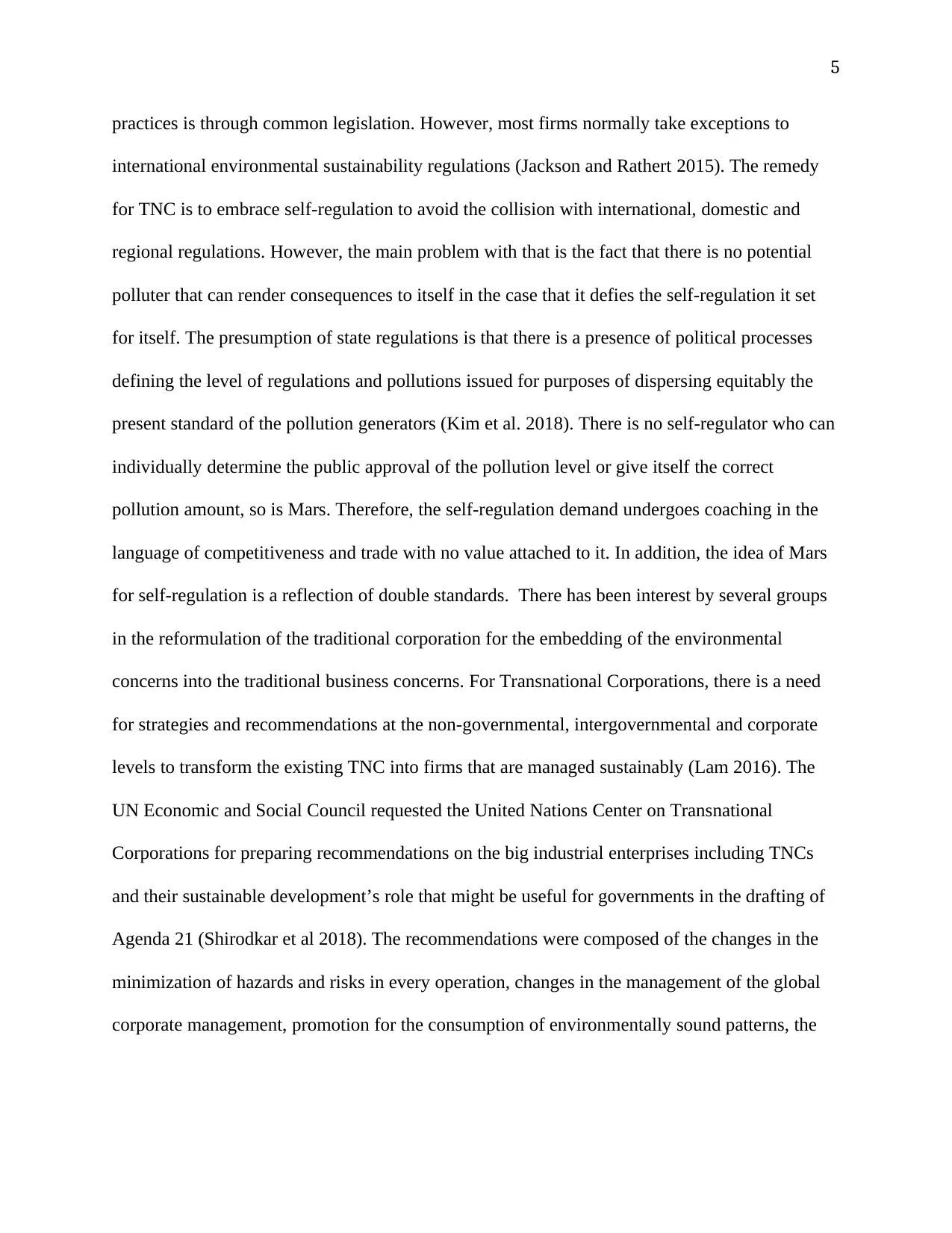
5
practices is through common legislation. However, most firms normally take exceptions to
international environmental sustainability regulations (Jackson and Rathert 2015). The remedy
for TNC is to embrace self-regulation to avoid the collision with international, domestic and
regional regulations. However, the main problem with that is the fact that there is no potential
polluter that can render consequences to itself in the case that it defies the self-regulation it set
for itself. The presumption of state regulations is that there is a presence of political processes
defining the level of regulations and pollutions issued for purposes of dispersing equitably the
present standard of the pollution generators (Kim et al. 2018). There is no self-regulator who can
individually determine the public approval of the pollution level or give itself the correct
pollution amount, so is Mars. Therefore, the self-regulation demand undergoes coaching in the
language of competitiveness and trade with no value attached to it. In addition, the idea of Mars
for self-regulation is a reflection of double standards. There has been interest by several groups
in the reformulation of the traditional corporation for the embedding of the environmental
concerns into the traditional business concerns. For Transnational Corporations, there is a need
for strategies and recommendations at the non-governmental, intergovernmental and corporate
levels to transform the existing TNC into firms that are managed sustainably (Lam 2016). The
UN Economic and Social Council requested the United Nations Center on Transnational
Corporations for preparing recommendations on the big industrial enterprises including TNCs
and their sustainable development’s role that might be useful for governments in the drafting of
Agenda 21 (Shirodkar et al 2018). The recommendations were composed of the changes in the
minimization of hazards and risks in every operation, changes in the management of the global
corporate management, promotion for the consumption of environmentally sound patterns, the
practices is through common legislation. However, most firms normally take exceptions to
international environmental sustainability regulations (Jackson and Rathert 2015). The remedy
for TNC is to embrace self-regulation to avoid the collision with international, domestic and
regional regulations. However, the main problem with that is the fact that there is no potential
polluter that can render consequences to itself in the case that it defies the self-regulation it set
for itself. The presumption of state regulations is that there is a presence of political processes
defining the level of regulations and pollutions issued for purposes of dispersing equitably the
present standard of the pollution generators (Kim et al. 2018). There is no self-regulator who can
individually determine the public approval of the pollution level or give itself the correct
pollution amount, so is Mars. Therefore, the self-regulation demand undergoes coaching in the
language of competitiveness and trade with no value attached to it. In addition, the idea of Mars
for self-regulation is a reflection of double standards. There has been interest by several groups
in the reformulation of the traditional corporation for the embedding of the environmental
concerns into the traditional business concerns. For Transnational Corporations, there is a need
for strategies and recommendations at the non-governmental, intergovernmental and corporate
levels to transform the existing TNC into firms that are managed sustainably (Lam 2016). The
UN Economic and Social Council requested the United Nations Center on Transnational
Corporations for preparing recommendations on the big industrial enterprises including TNCs
and their sustainable development’s role that might be useful for governments in the drafting of
Agenda 21 (Shirodkar et al 2018). The recommendations were composed of the changes in the
minimization of hazards and risks in every operation, changes in the management of the global
corporate management, promotion for the consumption of environmentally sound patterns, the
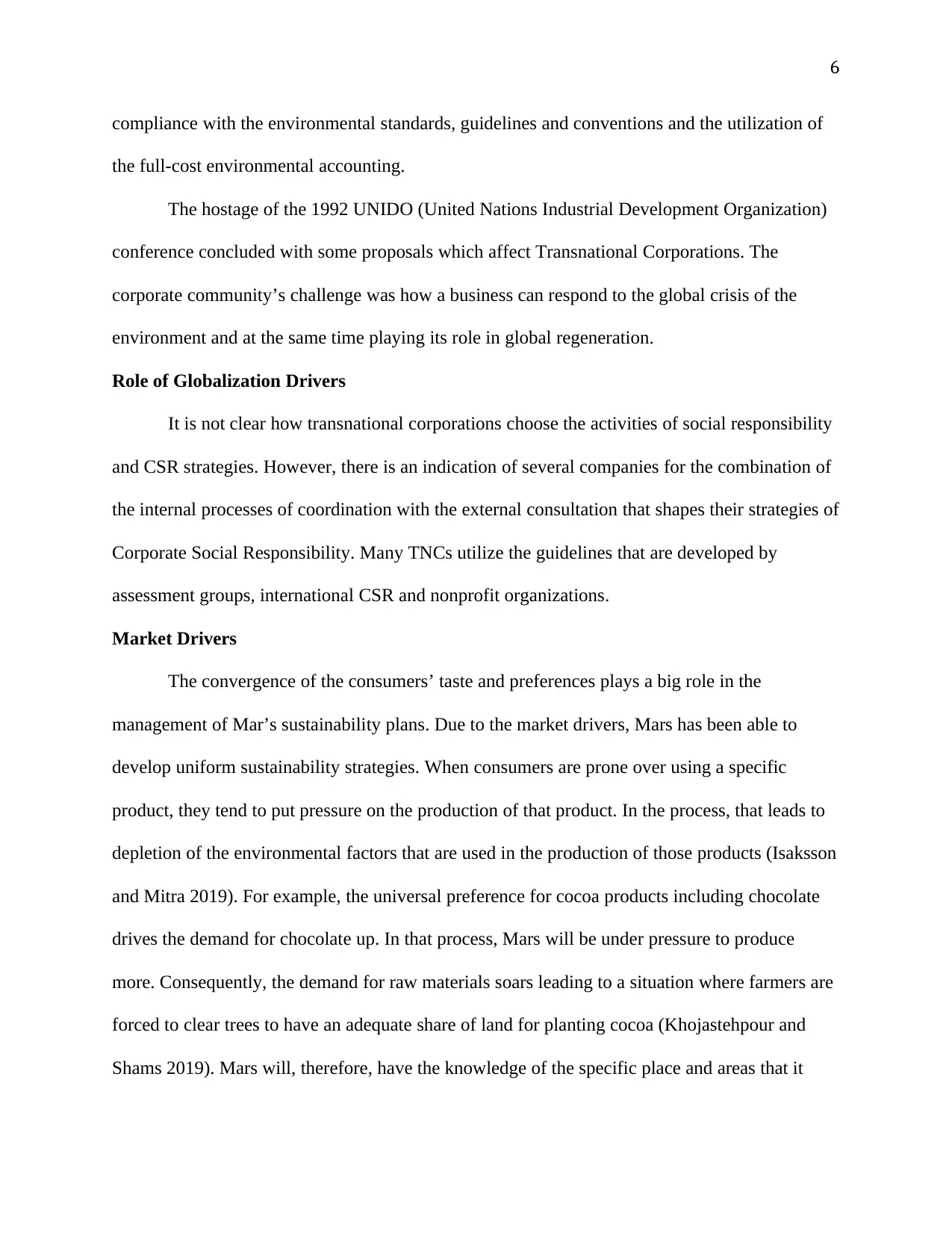
6
compliance with the environmental standards, guidelines and conventions and the utilization of
the full-cost environmental accounting.
The hostage of the 1992 UNIDO (United Nations Industrial Development Organization)
conference concluded with some proposals which affect Transnational Corporations. The
corporate community’s challenge was how a business can respond to the global crisis of the
environment and at the same time playing its role in global regeneration.
Role of Globalization Drivers
It is not clear how transnational corporations choose the activities of social responsibility
and CSR strategies. However, there is an indication of several companies for the combination of
the internal processes of coordination with the external consultation that shapes their strategies of
Corporate Social Responsibility. Many TNCs utilize the guidelines that are developed by
assessment groups, international CSR and nonprofit organizations.
Market Drivers
The convergence of the consumers’ taste and preferences plays a big role in the
management of Mar’s sustainability plans. Due to the market drivers, Mars has been able to
develop uniform sustainability strategies. When consumers are prone over using a specific
product, they tend to put pressure on the production of that product. In the process, that leads to
depletion of the environmental factors that are used in the production of those products (Isaksson
and Mitra 2019). For example, the universal preference for cocoa products including chocolate
drives the demand for chocolate up. In that process, Mars will be under pressure to produce
more. Consequently, the demand for raw materials soars leading to a situation where farmers are
forced to clear trees to have an adequate share of land for planting cocoa (Khojastehpour and
Shams 2019). Mars will, therefore, have the knowledge of the specific place and areas that it
compliance with the environmental standards, guidelines and conventions and the utilization of
the full-cost environmental accounting.
The hostage of the 1992 UNIDO (United Nations Industrial Development Organization)
conference concluded with some proposals which affect Transnational Corporations. The
corporate community’s challenge was how a business can respond to the global crisis of the
environment and at the same time playing its role in global regeneration.
Role of Globalization Drivers
It is not clear how transnational corporations choose the activities of social responsibility
and CSR strategies. However, there is an indication of several companies for the combination of
the internal processes of coordination with the external consultation that shapes their strategies of
Corporate Social Responsibility. Many TNCs utilize the guidelines that are developed by
assessment groups, international CSR and nonprofit organizations.
Market Drivers
The convergence of the consumers’ taste and preferences plays a big role in the
management of Mar’s sustainability plans. Due to the market drivers, Mars has been able to
develop uniform sustainability strategies. When consumers are prone over using a specific
product, they tend to put pressure on the production of that product. In the process, that leads to
depletion of the environmental factors that are used in the production of those products (Isaksson
and Mitra 2019). For example, the universal preference for cocoa products including chocolate
drives the demand for chocolate up. In that process, Mars will be under pressure to produce
more. Consequently, the demand for raw materials soars leading to a situation where farmers are
forced to clear trees to have an adequate share of land for planting cocoa (Khojastehpour and
Shams 2019). Mars will, therefore, have the knowledge of the specific place and areas that it
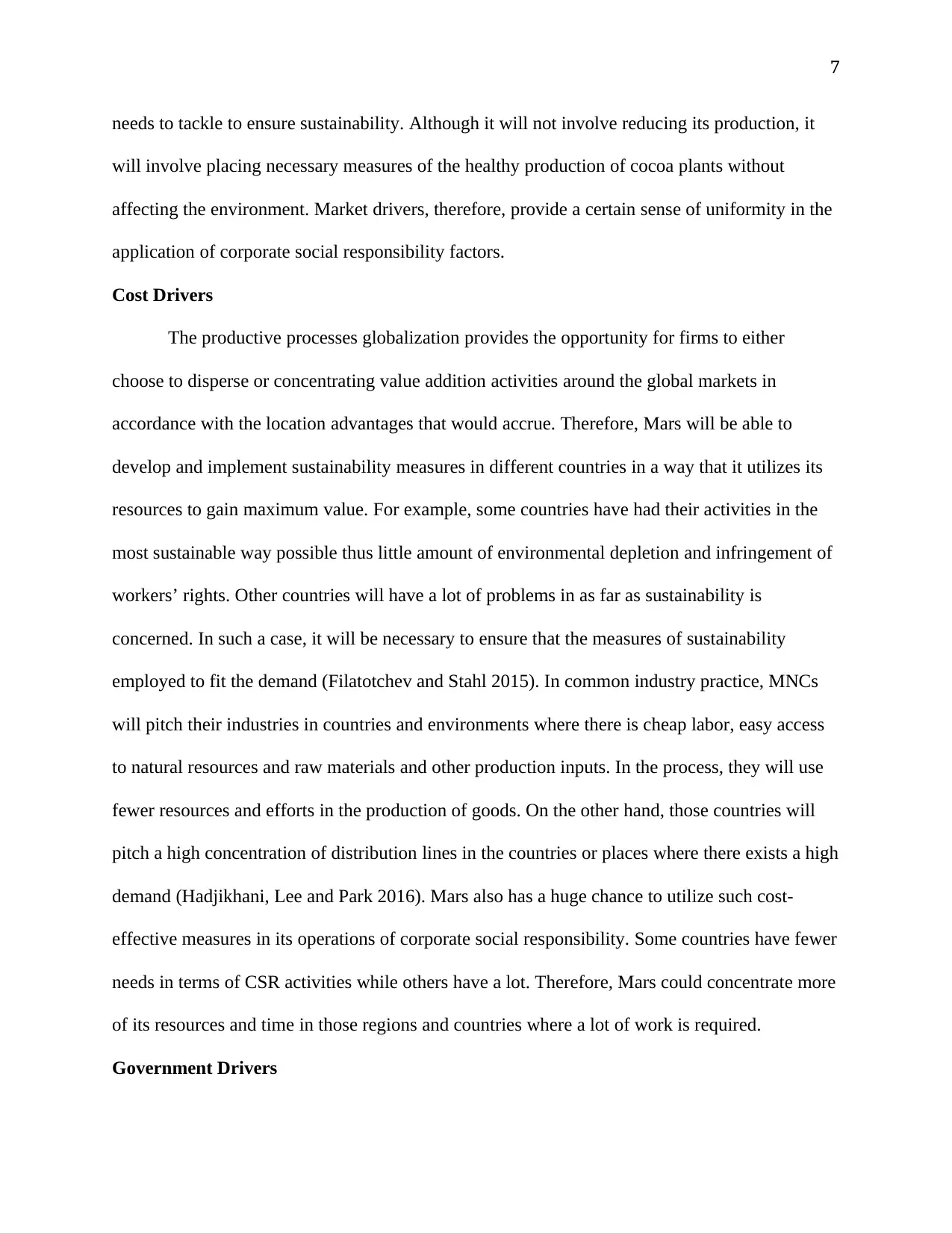
7
needs to tackle to ensure sustainability. Although it will not involve reducing its production, it
will involve placing necessary measures of the healthy production of cocoa plants without
affecting the environment. Market drivers, therefore, provide a certain sense of uniformity in the
application of corporate social responsibility factors.
Cost Drivers
The productive processes globalization provides the opportunity for firms to either
choose to disperse or concentrating value addition activities around the global markets in
accordance with the location advantages that would accrue. Therefore, Mars will be able to
develop and implement sustainability measures in different countries in a way that it utilizes its
resources to gain maximum value. For example, some countries have had their activities in the
most sustainable way possible thus little amount of environmental depletion and infringement of
workers’ rights. Other countries will have a lot of problems in as far as sustainability is
concerned. In such a case, it will be necessary to ensure that the measures of sustainability
employed to fit the demand (Filatotchev and Stahl 2015). In common industry practice, MNCs
will pitch their industries in countries and environments where there is cheap labor, easy access
to natural resources and raw materials and other production inputs. In the process, they will use
fewer resources and efforts in the production of goods. On the other hand, those countries will
pitch a high concentration of distribution lines in the countries or places where there exists a high
demand (Hadjikhani, Lee and Park 2016). Mars also has a huge chance to utilize such cost-
effective measures in its operations of corporate social responsibility. Some countries have fewer
needs in terms of CSR activities while others have a lot. Therefore, Mars could concentrate more
of its resources and time in those regions and countries where a lot of work is required.
Government Drivers
needs to tackle to ensure sustainability. Although it will not involve reducing its production, it
will involve placing necessary measures of the healthy production of cocoa plants without
affecting the environment. Market drivers, therefore, provide a certain sense of uniformity in the
application of corporate social responsibility factors.
Cost Drivers
The productive processes globalization provides the opportunity for firms to either
choose to disperse or concentrating value addition activities around the global markets in
accordance with the location advantages that would accrue. Therefore, Mars will be able to
develop and implement sustainability measures in different countries in a way that it utilizes its
resources to gain maximum value. For example, some countries have had their activities in the
most sustainable way possible thus little amount of environmental depletion and infringement of
workers’ rights. Other countries will have a lot of problems in as far as sustainability is
concerned. In such a case, it will be necessary to ensure that the measures of sustainability
employed to fit the demand (Filatotchev and Stahl 2015). In common industry practice, MNCs
will pitch their industries in countries and environments where there is cheap labor, easy access
to natural resources and raw materials and other production inputs. In the process, they will use
fewer resources and efforts in the production of goods. On the other hand, those countries will
pitch a high concentration of distribution lines in the countries or places where there exists a high
demand (Hadjikhani, Lee and Park 2016). Mars also has a huge chance to utilize such cost-
effective measures in its operations of corporate social responsibility. Some countries have fewer
needs in terms of CSR activities while others have a lot. Therefore, Mars could concentrate more
of its resources and time in those regions and countries where a lot of work is required.
Government Drivers
Paraphrase This Document
Need a fresh take? Get an instant paraphrase of this document with our AI Paraphraser
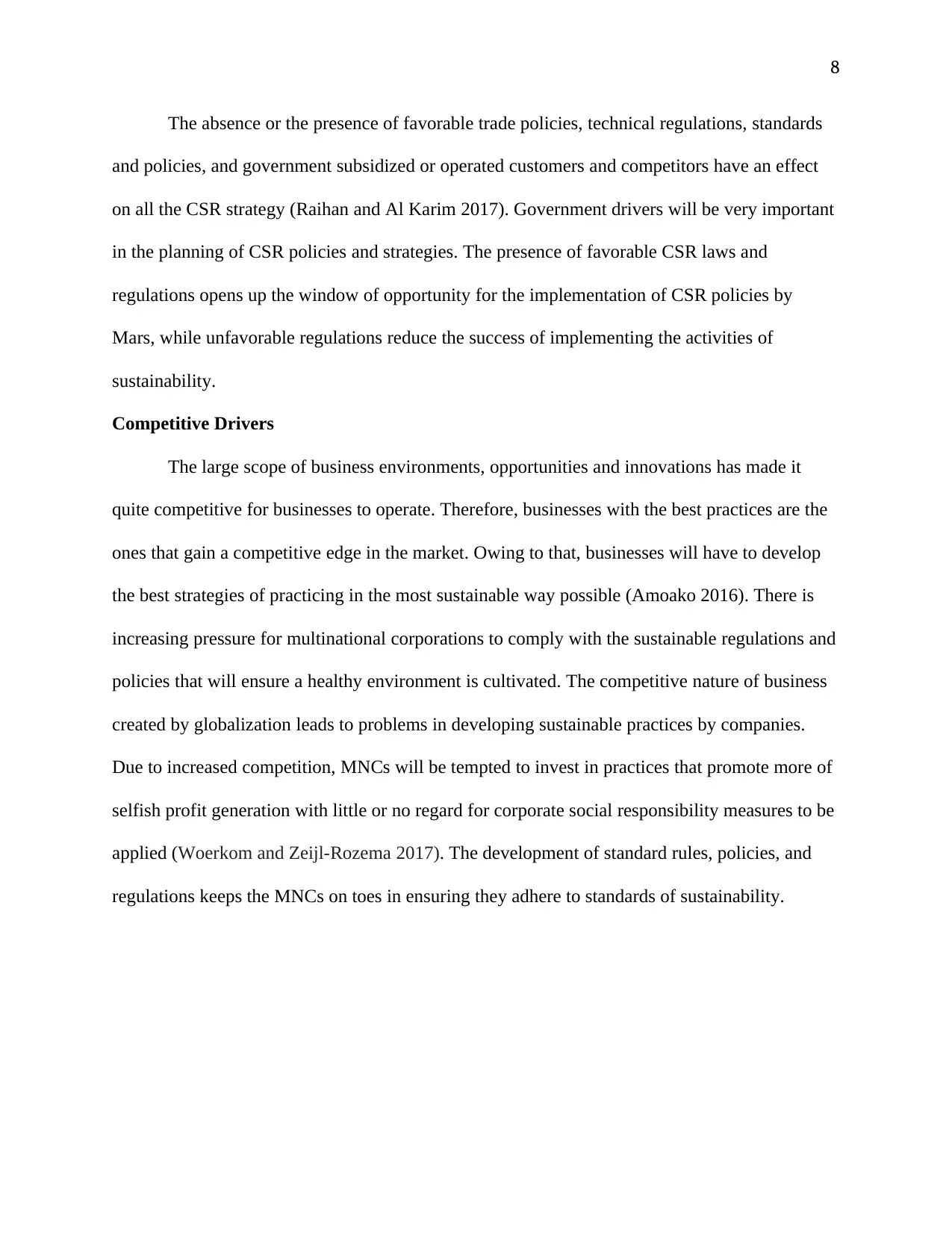
8
The absence or the presence of favorable trade policies, technical regulations, standards
and policies, and government subsidized or operated customers and competitors have an effect
on all the CSR strategy (Raihan and Al Karim 2017). Government drivers will be very important
in the planning of CSR policies and strategies. The presence of favorable CSR laws and
regulations opens up the window of opportunity for the implementation of CSR policies by
Mars, while unfavorable regulations reduce the success of implementing the activities of
sustainability.
Competitive Drivers
The large scope of business environments, opportunities and innovations has made it
quite competitive for businesses to operate. Therefore, businesses with the best practices are the
ones that gain a competitive edge in the market. Owing to that, businesses will have to develop
the best strategies of practicing in the most sustainable way possible (Amoako 2016). There is
increasing pressure for multinational corporations to comply with the sustainable regulations and
policies that will ensure a healthy environment is cultivated. The competitive nature of business
created by globalization leads to problems in developing sustainable practices by companies.
Due to increased competition, MNCs will be tempted to invest in practices that promote more of
selfish profit generation with little or no regard for corporate social responsibility measures to be
applied (Woerkom and Zeijl-Rozema 2017). The development of standard rules, policies, and
regulations keeps the MNCs on toes in ensuring they adhere to standards of sustainability.
The absence or the presence of favorable trade policies, technical regulations, standards
and policies, and government subsidized or operated customers and competitors have an effect
on all the CSR strategy (Raihan and Al Karim 2017). Government drivers will be very important
in the planning of CSR policies and strategies. The presence of favorable CSR laws and
regulations opens up the window of opportunity for the implementation of CSR policies by
Mars, while unfavorable regulations reduce the success of implementing the activities of
sustainability.
Competitive Drivers
The large scope of business environments, opportunities and innovations has made it
quite competitive for businesses to operate. Therefore, businesses with the best practices are the
ones that gain a competitive edge in the market. Owing to that, businesses will have to develop
the best strategies of practicing in the most sustainable way possible (Amoako 2016). There is
increasing pressure for multinational corporations to comply with the sustainable regulations and
policies that will ensure a healthy environment is cultivated. The competitive nature of business
created by globalization leads to problems in developing sustainable practices by companies.
Due to increased competition, MNCs will be tempted to invest in practices that promote more of
selfish profit generation with little or no regard for corporate social responsibility measures to be
applied (Woerkom and Zeijl-Rozema 2017). The development of standard rules, policies, and
regulations keeps the MNCs on toes in ensuring they adhere to standards of sustainability.
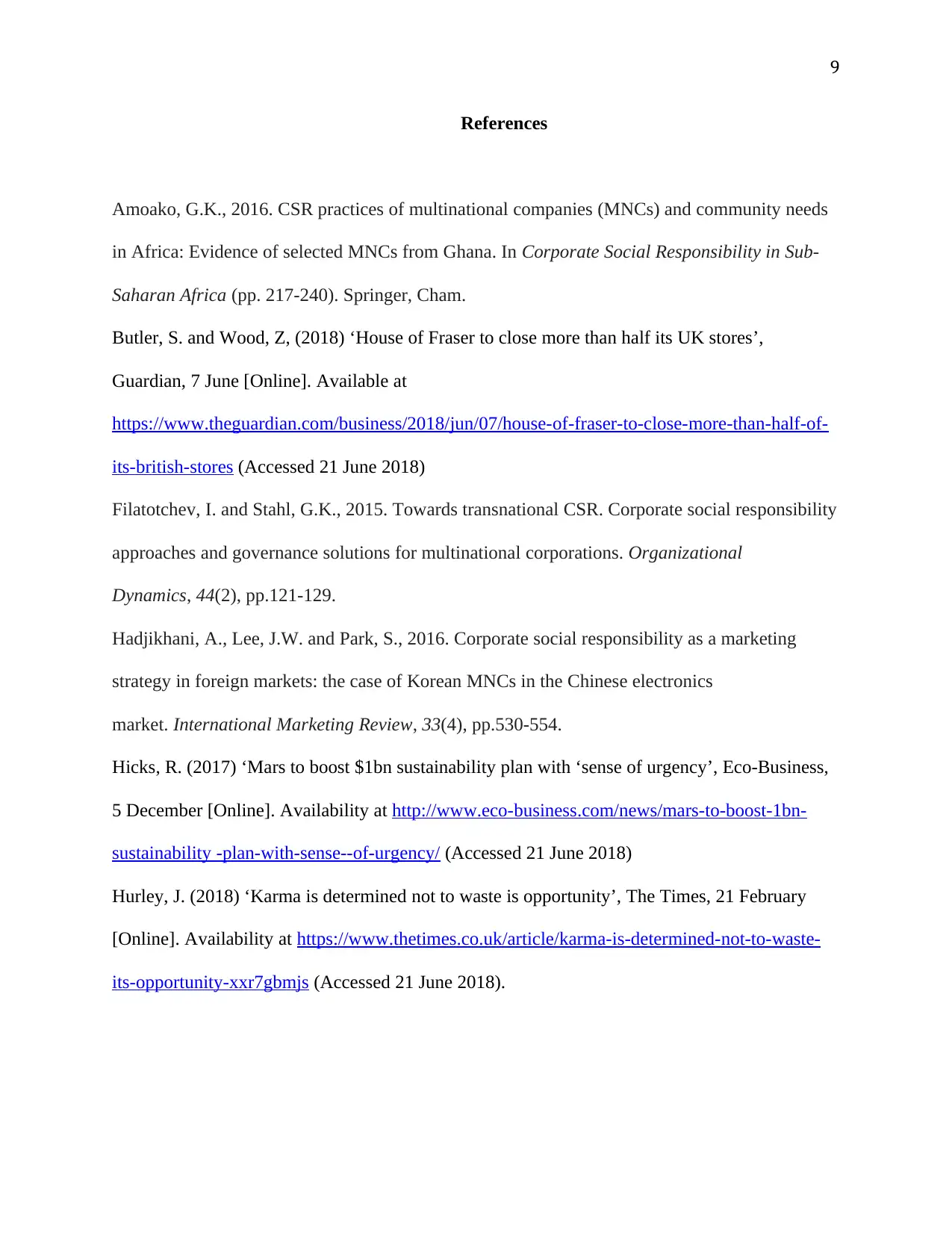
9
References
Amoako, G.K., 2016. CSR practices of multinational companies (MNCs) and community needs
in Africa: Evidence of selected MNCs from Ghana. In Corporate Social Responsibility in Sub-
Saharan Africa (pp. 217-240). Springer, Cham.
Butler, S. and Wood, Z, (2018) ‘House of Fraser to close more than half its UK stores’,
Guardian, 7 June [Online]. Available at
https://www.theguardian.com/business/2018/jun/07/house-of-fraser-to-close-more-than-half-of-
its-british-stores (Accessed 21 June 2018)
Filatotchev, I. and Stahl, G.K., 2015. Towards transnational CSR. Corporate social responsibility
approaches and governance solutions for multinational corporations. Organizational
Dynamics, 44(2), pp.121-129.
Hadjikhani, A., Lee, J.W. and Park, S., 2016. Corporate social responsibility as a marketing
strategy in foreign markets: the case of Korean MNCs in the Chinese electronics
market. International Marketing Review, 33(4), pp.530-554.
Hicks, R. (2017) ‘Mars to boost $1bn sustainability plan with ‘sense of urgency’, Eco-Business,
5 December [Online]. Availability at http://www.eco-business.com/news/mars-to-boost-1bn-
sustainability -plan-with-sense--of-urgency/ (Accessed 21 June 2018)
Hurley, J. (2018) ‘Karma is determined not to waste is opportunity’, The Times, 21 February
[Online]. Availability at https://www.thetimes.co.uk/article/karma-is-determined-not-to-waste-
its-opportunity-xxr7gbmjs (Accessed 21 June 2018).
References
Amoako, G.K., 2016. CSR practices of multinational companies (MNCs) and community needs
in Africa: Evidence of selected MNCs from Ghana. In Corporate Social Responsibility in Sub-
Saharan Africa (pp. 217-240). Springer, Cham.
Butler, S. and Wood, Z, (2018) ‘House of Fraser to close more than half its UK stores’,
Guardian, 7 June [Online]. Available at
https://www.theguardian.com/business/2018/jun/07/house-of-fraser-to-close-more-than-half-of-
its-british-stores (Accessed 21 June 2018)
Filatotchev, I. and Stahl, G.K., 2015. Towards transnational CSR. Corporate social responsibility
approaches and governance solutions for multinational corporations. Organizational
Dynamics, 44(2), pp.121-129.
Hadjikhani, A., Lee, J.W. and Park, S., 2016. Corporate social responsibility as a marketing
strategy in foreign markets: the case of Korean MNCs in the Chinese electronics
market. International Marketing Review, 33(4), pp.530-554.
Hicks, R. (2017) ‘Mars to boost $1bn sustainability plan with ‘sense of urgency’, Eco-Business,
5 December [Online]. Availability at http://www.eco-business.com/news/mars-to-boost-1bn-
sustainability -plan-with-sense--of-urgency/ (Accessed 21 June 2018)
Hurley, J. (2018) ‘Karma is determined not to waste is opportunity’, The Times, 21 February
[Online]. Availability at https://www.thetimes.co.uk/article/karma-is-determined-not-to-waste-
its-opportunity-xxr7gbmjs (Accessed 21 June 2018).
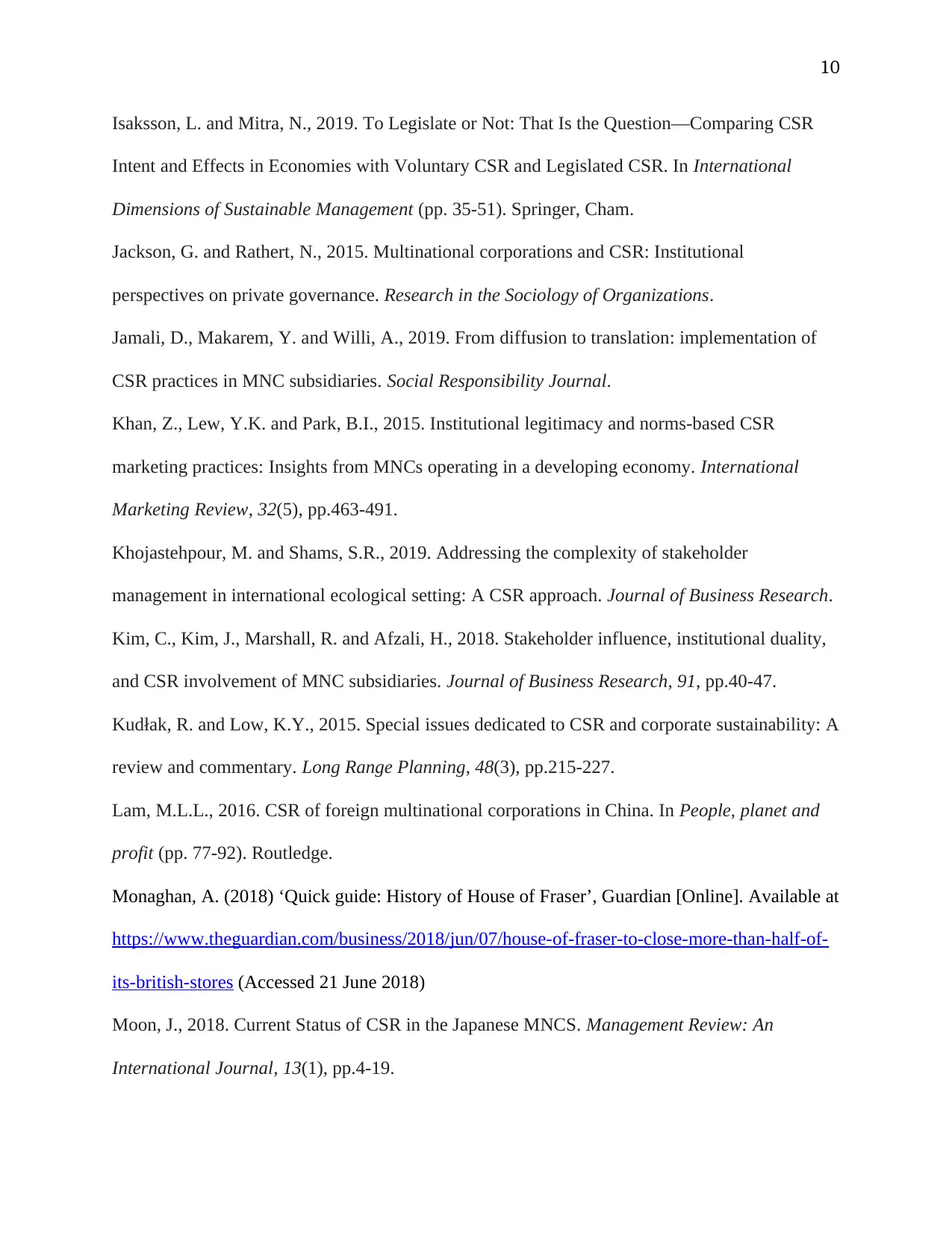
10
Isaksson, L. and Mitra, N., 2019. To Legislate or Not: That Is the Question—Comparing CSR
Intent and Effects in Economies with Voluntary CSR and Legislated CSR. In International
Dimensions of Sustainable Management (pp. 35-51). Springer, Cham.
Jackson, G. and Rathert, N., 2015. Multinational corporations and CSR: Institutional
perspectives on private governance. Research in the Sociology of Organizations.
Jamali, D., Makarem, Y. and Willi, A., 2019. From diffusion to translation: implementation of
CSR practices in MNC subsidiaries. Social Responsibility Journal.
Khan, Z., Lew, Y.K. and Park, B.I., 2015. Institutional legitimacy and norms-based CSR
marketing practices: Insights from MNCs operating in a developing economy. International
Marketing Review, 32(5), pp.463-491.
Khojastehpour, M. and Shams, S.R., 2019. Addressing the complexity of stakeholder
management in international ecological setting: A CSR approach. Journal of Business Research.
Kim, C., Kim, J., Marshall, R. and Afzali, H., 2018. Stakeholder influence, institutional duality,
and CSR involvement of MNC subsidiaries. Journal of Business Research, 91, pp.40-47.
Kudłak, R. and Low, K.Y., 2015. Special issues dedicated to CSR and corporate sustainability: A
review and commentary. Long Range Planning, 48(3), pp.215-227.
Lam, M.L.L., 2016. CSR of foreign multinational corporations in China. In People, planet and
profit (pp. 77-92). Routledge.
Monaghan, A. (2018) ‘Quick guide: History of House of Fraser’, Guardian [Online]. Available at
https://www.theguardian.com/business/2018/jun/07/house-of-fraser-to-close-more-than-half-of-
its-british-stores (Accessed 21 June 2018)
Moon, J., 2018. Current Status of CSR in the Japanese MNCS. Management Review: An
International Journal, 13(1), pp.4-19.
Isaksson, L. and Mitra, N., 2019. To Legislate or Not: That Is the Question—Comparing CSR
Intent and Effects in Economies with Voluntary CSR and Legislated CSR. In International
Dimensions of Sustainable Management (pp. 35-51). Springer, Cham.
Jackson, G. and Rathert, N., 2015. Multinational corporations and CSR: Institutional
perspectives on private governance. Research in the Sociology of Organizations.
Jamali, D., Makarem, Y. and Willi, A., 2019. From diffusion to translation: implementation of
CSR practices in MNC subsidiaries. Social Responsibility Journal.
Khan, Z., Lew, Y.K. and Park, B.I., 2015. Institutional legitimacy and norms-based CSR
marketing practices: Insights from MNCs operating in a developing economy. International
Marketing Review, 32(5), pp.463-491.
Khojastehpour, M. and Shams, S.R., 2019. Addressing the complexity of stakeholder
management in international ecological setting: A CSR approach. Journal of Business Research.
Kim, C., Kim, J., Marshall, R. and Afzali, H., 2018. Stakeholder influence, institutional duality,
and CSR involvement of MNC subsidiaries. Journal of Business Research, 91, pp.40-47.
Kudłak, R. and Low, K.Y., 2015. Special issues dedicated to CSR and corporate sustainability: A
review and commentary. Long Range Planning, 48(3), pp.215-227.
Lam, M.L.L., 2016. CSR of foreign multinational corporations in China. In People, planet and
profit (pp. 77-92). Routledge.
Monaghan, A. (2018) ‘Quick guide: History of House of Fraser’, Guardian [Online]. Available at
https://www.theguardian.com/business/2018/jun/07/house-of-fraser-to-close-more-than-half-of-
its-british-stores (Accessed 21 June 2018)
Moon, J., 2018. Current Status of CSR in the Japanese MNCS. Management Review: An
International Journal, 13(1), pp.4-19.
Secure Best Marks with AI Grader
Need help grading? Try our AI Grader for instant feedback on your assignments.
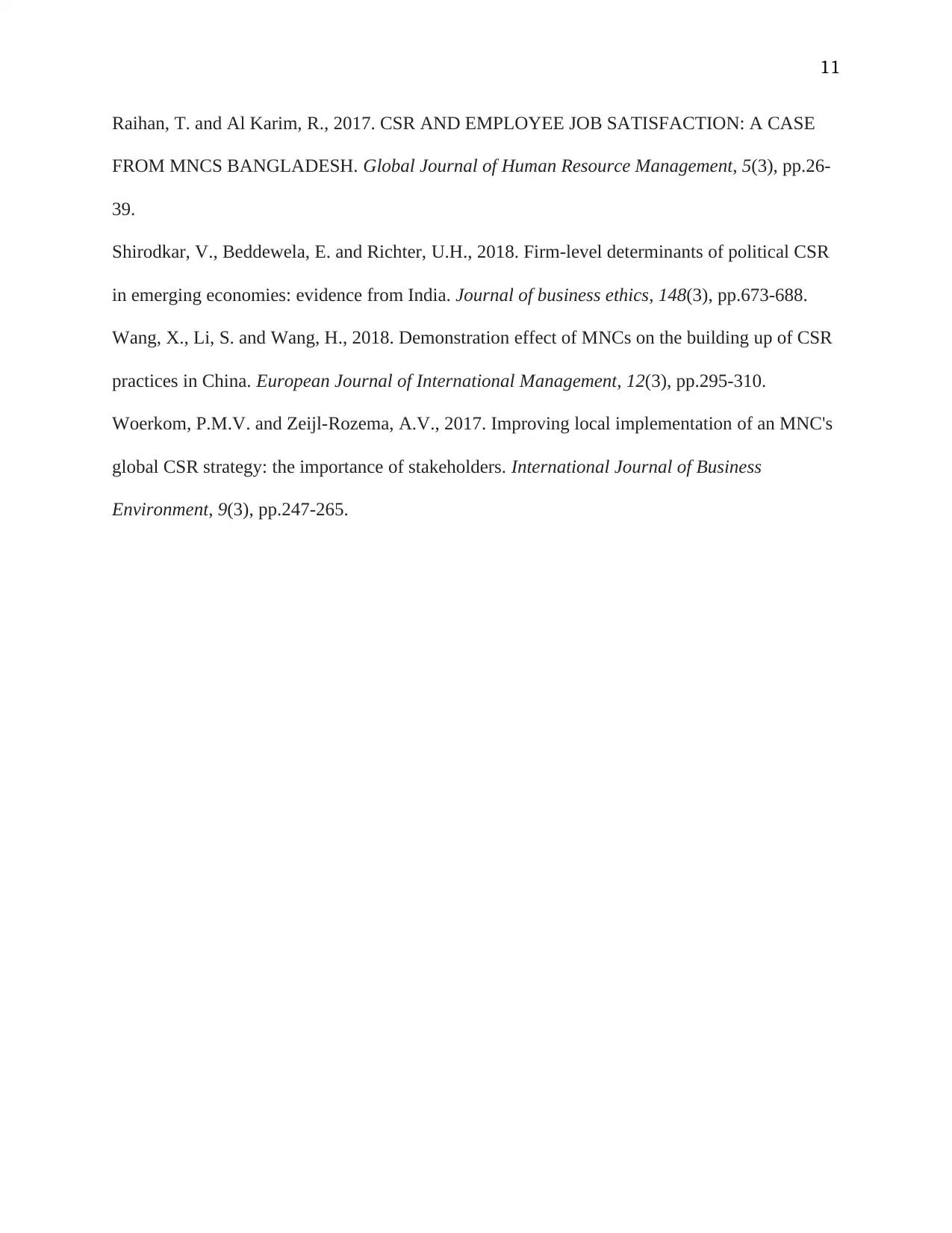
11
Raihan, T. and Al Karim, R., 2017. CSR AND EMPLOYEE JOB SATISFACTION: A CASE
FROM MNCS BANGLADESH. Global Journal of Human Resource Management, 5(3), pp.26-
39.
Shirodkar, V., Beddewela, E. and Richter, U.H., 2018. Firm-level determinants of political CSR
in emerging economies: evidence from India. Journal of business ethics, 148(3), pp.673-688.
Wang, X., Li, S. and Wang, H., 2018. Demonstration effect of MNCs on the building up of CSR
practices in China. European Journal of International Management, 12(3), pp.295-310.
Woerkom, P.M.V. and Zeijl-Rozema, A.V., 2017. Improving local implementation of an MNC's
global CSR strategy: the importance of stakeholders. International Journal of Business
Environment, 9(3), pp.247-265.
Raihan, T. and Al Karim, R., 2017. CSR AND EMPLOYEE JOB SATISFACTION: A CASE
FROM MNCS BANGLADESH. Global Journal of Human Resource Management, 5(3), pp.26-
39.
Shirodkar, V., Beddewela, E. and Richter, U.H., 2018. Firm-level determinants of political CSR
in emerging economies: evidence from India. Journal of business ethics, 148(3), pp.673-688.
Wang, X., Li, S. and Wang, H., 2018. Demonstration effect of MNCs on the building up of CSR
practices in China. European Journal of International Management, 12(3), pp.295-310.
Woerkom, P.M.V. and Zeijl-Rozema, A.V., 2017. Improving local implementation of an MNC's
global CSR strategy: the importance of stakeholders. International Journal of Business
Environment, 9(3), pp.247-265.
1 out of 11
Your All-in-One AI-Powered Toolkit for Academic Success.
+13062052269
info@desklib.com
Available 24*7 on WhatsApp / Email
![[object Object]](/_next/static/media/star-bottom.7253800d.svg)
Unlock your academic potential
© 2024 | Zucol Services PVT LTD | All rights reserved.